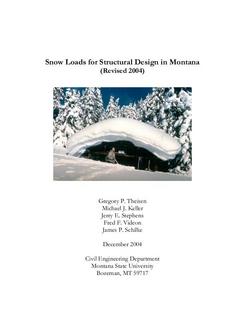The
design ground snow loads at specific stations around the state of
Montana are
available in the snow loads tables in the downloadable copy of the snow
loads report highlighted at the bottom of this page.
The tool below provides ground snow
load values for any latitude and longitude in the state of
Montana, and it is intended to be used to find snow loads
at points away from a
station and/or at a different elevation from a station. This
value is the result of an interpolation of station
values (normalized to elevation) that is multiplied by the actual
elevation at the location of interest. This tool is the preferred
method for finding ground snow loads, relative to the snow load
contour maps contained in the report below. The
Snow Load
Finder also provides snow load and elevation information from the
three closest stations surrounding the point of interest, so that the
engineer can get a sense of the local variation of the snow loads in
the area of interest. The methodology used to develop this tool,
values of ground snow
loads for sampled sites, and example solved problems are contained in
the document downloadable at the bottom of this page. It is very
important that the user of this Snow
Load Finder Tool understand how to properly interpret the results it
provides and use good engineering judgement in their implementation. It is important to
remember that elevation is a critical parameter
in determining ground snow loads in Montana (snow loads increase with
elevation).
Upon determining the ground snow load for a specific location, it
is recommended that the design engineer check with local building
officials (in the area of the structure) for minimum ground or roof
snow load values to be used for design of structures in that location.
Consideration should also be given to any conditions that might
influence snow accumulation at the specific site of interest relative
to the `average' maximum ground snow load reported for the area by this
tool.
Local and/or state requirements on the ground snow loads or the
roof loads subsequently calculated from these values supercede the
values provided by this Snow Load Finder Tool. Note that the State of
Montana requires a minimum roof snow load of 30 psf be used for design.
Montana Ground Snow Load
Finder
This revision to the manual "Snowloads for Structural Design in
Montana (Revised, 2004)" was made possible by the support of the Civil
Engineering Department at Montana State University and the Montana
Section of the American Society of Civil Engineers. Please send
contributions
to offset the cost of this effort to:
Snow Loads Guide
c/o Civil Engineering Dept.
205 Cobleigh Hall - MSU
Bozeman, MT 59717 - 3900
Please make checks payable to Montana State University (suggested
amount:
$50.00).
 MT Snowloads
with Maps (pdf file) (54 Mb file)
MT Snowloads
with Maps (pdf file) (54 Mb file)
MT Snowloads without Maps
(pdf file) (4 Mb file)
Corrected Snow Load Map 5
(pdf file) (2 Mb file)
Technical questions about the application can be directed to:
Jerry Stephens


